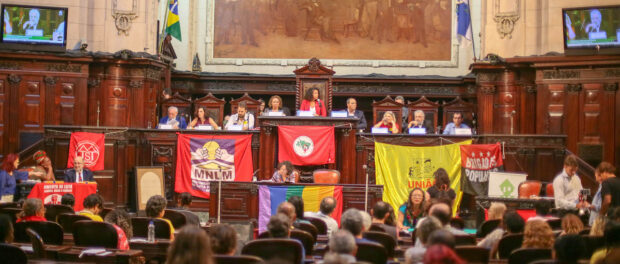
On Wednesday, June 26, housing rights activists and community leaders flooded the Rio de Janeiro State Legislative Assembly (ALERJ) for a public hearing on affordable housing in the state of Rio de Janeiro. Convened by members of ALERJ’s Human Rights and Citizenship Commission, Urban Policy Commission, Housing Commission, and Special Commission on Governance of the Rio Metropolitan Region, representatives discussed measures to more closely supervise the state government’s allocation of funding for housing given budgetary mismanagement and noncompliance with legally established funding mechanisms in recent years.
According to Lurdinha Lopes, a coordinator of the National Movement for the Fight for Housing (MNLM), approximately half a million families are homeless or live in unsafe or precarious conditions in the state of Rio de Janeiro, and the normalization of precarious housing conditions has hindered government action on the matter. Constant problems faced by residents living in precarious living conditions include risk from improper sanitation, floods resulting from drainage issues and landslides, among others. “In recent years, this situation has intensified, as over R$1 billion (US$250 million) have been diverted from the [state] housing budget for other purposes,” said Lopes during her speech at the hearing.
In this context, the main objective of the hearing was to demand that adequate funding for housing as required by law be implemented, rather than diverted for other purposes such as public spending on road works. State representatives in attendance included Flavio Serafini, Renata Souza, and Eliomar Coelho of the Socialism and Liberty Party (PSOL), and Waldeck Carneiro da Silva and Zeidan Lula of the Workers’ Party (PT).

Zeidan Lula, president of ALERJ’s Housing Commission, emphasized that affordable and safe housing is not only a human right but also a right in accordance with the Brazilian Constitution. Due to the state government’s consistent failure to properly allocate funding for housing, however, the representatives presiding over the hearing emphasized the urgency of compliance with Law 4.962/06, which established the State Fund for Social Interest Housing (FEHIS). The law identifies permanent funding sources for affordable housing projects, including the allocation of 5% of revenue from the State Fund to Combat Poverty (FECP), in order to eliminate the state’s housing deficit in the medium- to long-term, guarantee dignified and decent housing for low-income populations, and safeguard human rights, among other objectives. According to social movement representatives, the law’s provisions have not been fulfilled since 2016.
Representative Carneiro pointed to the inadequacy of the provision of social rent, intended to serve as a temporary measure to assist families in need, as a policy solution: “Social rent is a transitional welfare policy for emergency situations that should, through government policy, be substituted by the construction of dignified housing. There are legal instruments available—what is lacking is government compliance with the law.”
Beyond disregard for the law, Adauto Cardoso, a professor at the Federal University of Rio de Janeiro (UFRJ) and researcher at the Metropolis Observatory, identified the lack of data as an additional hindrance to the guarantee of adequate housing: “There needs to be more systematic research on the issue, as there is in other countries. Only then will we have a more accurate purview of the current situation, not only in terms of the housing deficit but also the number of precarious housing units. But the opposite is happening today—the scope of the census is being reduced,” he noted.
Another featured speaker was state representative Renata Souza (PSOL), who serves as president of ALERJ’s Human Rights Commission. Souza stated that the representatives in attendance planned to propose a constitutional amendment to demand a continuous source of funding for public housing. This amendment would require the state to allocate 1% of sales tax (known as ICMS) revenue for housing, with the funding managed directly by the State Fund for Social Interest Housing. According to Souza, this would create a more direct link between the management and the actual implementation of the funding, ensuring the timely allocation of funding for projects and yielding more tangible results in terms of improved housing outcomes.
Souza emphasized the importance of the public hearing as a space for groups engaged in housing struggles and those in need of affordable housing to participate in the political process. Since the lack of funding has been the result of mismanagement and failure of the government to listen to the demands of residents engaged in housing struggles, it is integral that the public understands the amendment being proposed and actively participate in the fight for adequate housing. “When we hold a public hearing, we are here to listen to the demands made by society,” Souza stated. “The principal objective of this public hearing is not only for the population to state their demands but also to understand that there are many public representatives who want to collaborate with the fight for decent housing and real access to the city.”




